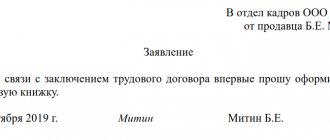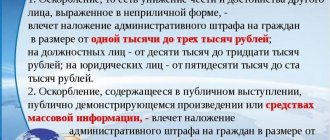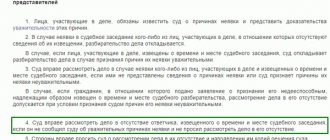Many people insult government officials or some profession in absentia. Someone, having committed an offense, expresses insults directly to the face of a government official, most often police officers. You will learn from our article what insulting a government official is and what the consequences may be.
ATTENTION: watch a video about defending your innocence by a criminal lawyer at the law firm “Katsailidi and Partners”, Yekaterinburg and subscribe to our YouTube channel
What is an insult to a government official?
To understand what constitutes an insult to a government official, it is necessary to understand who a government representative is?
A representative of the government is a person who is an official of law enforcement, regulatory or other bodies. Such a person must be vested with administrative powers in relation to persons who are not in an official relationship with him.
Insulting a government official is a public humiliation of his honor and dignity, which is expressed in an indecent form. An insult can occur both during the performance of a person’s duties, and in connection with their performance.
Insult can be expressed in words, actions, in writing or in other forms.
In addition to a public insult to a government official, there can also be a non-public insult to a person. In this case, the honor and dignity of a person is also humiliated, but not publicly.
INTERESTING : read about the distinguishing features of slander from insult on our website of AB “Katsailidi and Partners” at the link
How is this crime committed?
The term “objective side of the crime” answers the question of how this insult was applied to an official or other representative of a government structure. That is, under what conditions is the act qualified as an insult to a person in authority?
ATTENTION !!! The crime provided for in the article in question can only be committed through actions, and a wide variety of them. You can humiliate honor and dignity verbally (i.e. through any statements in oral or written form), through indecent gestures or through offensive images.
What is the penalty for insulting a police officer or government official?
In case of insulting a police officer or a representative of the authorities in public, the person faces criminal liability. Recently, it has not become so uncommon to bring criminals who committed insults, most often employees of the position, to this type of responsibility.
The criminal element of the act in question provides for punishment in the form of a fine, compulsory or correctional labor. But the most negative point in this case is that the person has a criminal record for breaking the law.
In a situation where a government official is insulted in a non-public manner, the offender faces the risk of being brought before the general administrative body for insult. In this case, the person faces a fine.
Features of the offense
Insulting the current Head of State is different from humiliating an ordinary citizen. Indeed, in the case of the President, angry and indecent words can discredit the current system and the activities of the official. This may lead to disruptions in the activities of government agencies.
That is why the law is more strict in cases where the honor and dignity of the Head of the country is affected. That is why insult is unacceptable, even if a person has reasons for it. In any case, dissatisfaction can be expressed in cultural form.
Let us note that a bill is currently being prepared for the State Duma, according to which they want to impose a separate punishment for insulting the President. It implies imprisonment from three to six years. But at the moment it has not yet been adopted, so a criminal article is in force.
Criminal liability for insulting a government official
The most relevant and important for understanding is criminal liability for insulting the Criminal Code of the Russian Federation.
The corresponding type of liability occurs in the event of a public insult to a government official for performing certain duties in accordance with the law.
Punishment for committing the crime in question faces the offender in the form of:
- a fine, the amount of which can reach 40 thousand rubles. or assigned in the amount of earnings or other income for a period of up to 3 months
- compulsory work up to 360 hours
- corrective labor for up to 1 year
Legislative initiatives
In 2021, deputies of the State Duma, led by Roman Khudyakov (LDPR), began work on developing a law that would protect the President of the Russian Federation from offensive attacks on his person. The bill is planned to be based on the law in force in the USSR, which provided for punishment for a similar crime in the form of imprisonment for up to six years.
Justifying the need to introduce such a crime into the Criminal Code of Russia, its initiators name the following reasons:
1) the president is the head of state and, therefore, an insult to him is an insult to the current government and the order of government;
2) unpunished negative statements addressed to a senior official can contribute to the emergence of a stable negative attitude towards him among the population;
3) the special legal status of the President of the Russian Federation must be taken into account when assigning punishment for insulting him, and the current legislation does not provide such an opportunity.
Despite the significance of such an initiative, the corresponding amendments have not yet been made to the Criminal Code of the Russian Federation.
Defense for insulting a police officer or government official
If a person is charged with insulting a police officer or government official, the defense will depend on several circumstances.
First of all, when defending, it will matter in what form the insult was expressed, namely, verbally, in the form of actions or in another way.
If the insult was verbal, then it will be necessary to prove that the words expressed by the person were not an insult (if there is a chance, of course). In such situations, as a rule, a linguistic examination is carried out. In addition, the person could use obscene language, however, this obscene speech did not refer to a specific official.
In the case of offensive actions, it will also matter whether these actions were committed against a specific person or whether it happened accidentally and the person did not intend to insult, for example, a police officer.
The defense will be based on whether the person pleads guilty or not. If a person admits guilt, then in this case the defense carries out general actions aimed at mitigating the punishment of its client, namely: collecting characterizing material, indicating an admission of guilt, and repentance. In an administrative case, the same set of protective actions can be carried out.
What exactly can be classified as actions that offend those in power?
Firstly, unflattering statements regarding government officials are often allowed at rallies, pickets and other similar meetings. Offensive words are uttered by persons speaking to protesters, or contained in leaflets distributed, or written on posters carried by participants in a given meeting.
IMPORTANT !!! With today's development of technology, it is very easy for such an insult to be recorded on video and, subsequently, to serve as evidence in court. If necessary, an examination of the authenticity of the video recording is carried out.
Moreover, if leaflets are distributed, both the one who ordered their release and the one who distributed these materials will be punished. Same with posters. Both the person carrying the offensive poster and the person who ordered it are charged under Article 319.
The next type of verbal insult is various publications in print media. The author of the offensive material will be prosecuted under Article 319 and, in some cases, the person who signed the order to send this issue of the newspaper or magazine to print will be dragged along with him. If a journalist tries to “disown” the authorship of an article, then an author’s examination may already be assigned, since each person has his own unique style. But such an examination does not give a 100% correct result, because the author’s style can be faked. Therefore, such an examination cannot lay claim to the laurels of the “queen of evidence,” although its results will still be considered by the court.
ATTENTION !!! All verbal insults can be committed both using obscenities and other indecent expressions, or expressed in an outwardly cultural form, but with humiliating content. These can be derogatory analogies, allusions, associations. That is, the insult here is not obvious, as in the first case, but veiled. Therefore, many people believe that in this case there will be no responsibility, but in vain. If necessary, a forensic examination can be ordered with the involvement of specialist philologists, who will render their verdict regarding the content of the statement. The judge will readily accept the results of such examinations as evidence.
There are also offensive actions - spitting in the face (the old Russian synonym for insult is the word “spitting”), demonstration of indecent gestures, as well as exposure of intimate parts of the body, throwing rotten eggs, rotten tomatoes and other garbage.
A separate type of humiliating actions is the creation of pictures with offensive content. Both the image itself and an indecent inscription can undermine the authority of a statesman.
IMPORTANT !!! The common feature of all these actions is publicity. That is, such an insult, due to publication in the media or otherwise, became available to a wide range of people.
The occurrence of harmful consequences as such is not required for the crime to be considered completed. It is enough to commit actions that degrade the dignity of a representative of power. It does not matter how much the status of a given bearer of state power has fallen in the eyes of the public. But, since the Criminal Code of the Russian Federation provides for each crime its own “fork” of punishment, then the judge can take into account the consequences of such an insult.
Public insult to a police officer or government official
Publicity of an insult is a mandatory feature for bringing the offender to criminal liability.
Public insult of a police officer or government official is expressed in humiliation of the honor and dignity of the person in question in the presence of other persons, or this becomes known to many people from public speeches and the media. In the age of the Internet, publicity is off the charts, so you need to be careful when using certain expressions in relation to government officials.
Since the insult is public, the evidence will be the testimony of witnesses or information from the media.
Foreign practice
Quite often, news appears in the media that Western or American journalists have been fired from their posts after offensive actions or statements addressed to the president. There are also frequent cases of actually bringing the perpetrators of such crimes to criminal liability.
Against this background, Russian legislation looks very liberal due to the absence of a separate article providing for criminal punishment for insulting the head of state.
In most European countries, such acts can result in imprisonment ranging from 6 months to several years.
Thus, in Poland the maximum term of imprisonment for insulting the president is three years, in Azerbaijan – 24 months. Iranian legislation is more democratic - imprisonment here can only be for six months, but corporal punishment is also allowed for the perpetrator.
Lawyer for insulting government officials in Yekaterinburg
The lawyers of our Law Office “Katsailidi and Partners” are always ready to assist in protecting the interests of clients related to insulting government officials. Defense can serve not only the interests of lawbreakers, but also the victims of such crimes.
By contacting our lawyers regarding insult issues, you can receive:
- legal advice on how to punish for insult and how to build a defense when charged with this offense
- assessment by lawyers of your actions or the actions of the offender for the presence of elements of a crime for insult or administrative charges
- algorithm of the principal's actions in a specific situation
- preparing an application to initiate a criminal or administrative case
- representing the interests of the principal at the stage of preliminary investigation of the case and in court
- preparing a lawsuit for compensation for moral damages
- preparation of complaints against decisions of law enforcement agencies and courts
- providing other necessary assistance
How to protect yourself from insults
The protection of individual rights and freedoms in the Russian Federation is within the competence of the prosecutor's office.
To initiate a case you must:
- describe in detail the circumstances under which the attack on honor and dignity was committed;
- attach supporting materials to the application - photos and videos, publications in the media, social networks;
- involve witnesses to give explanations.
Based on the evidence, the prosecutor's office will initiate a case and refer it to the court.







